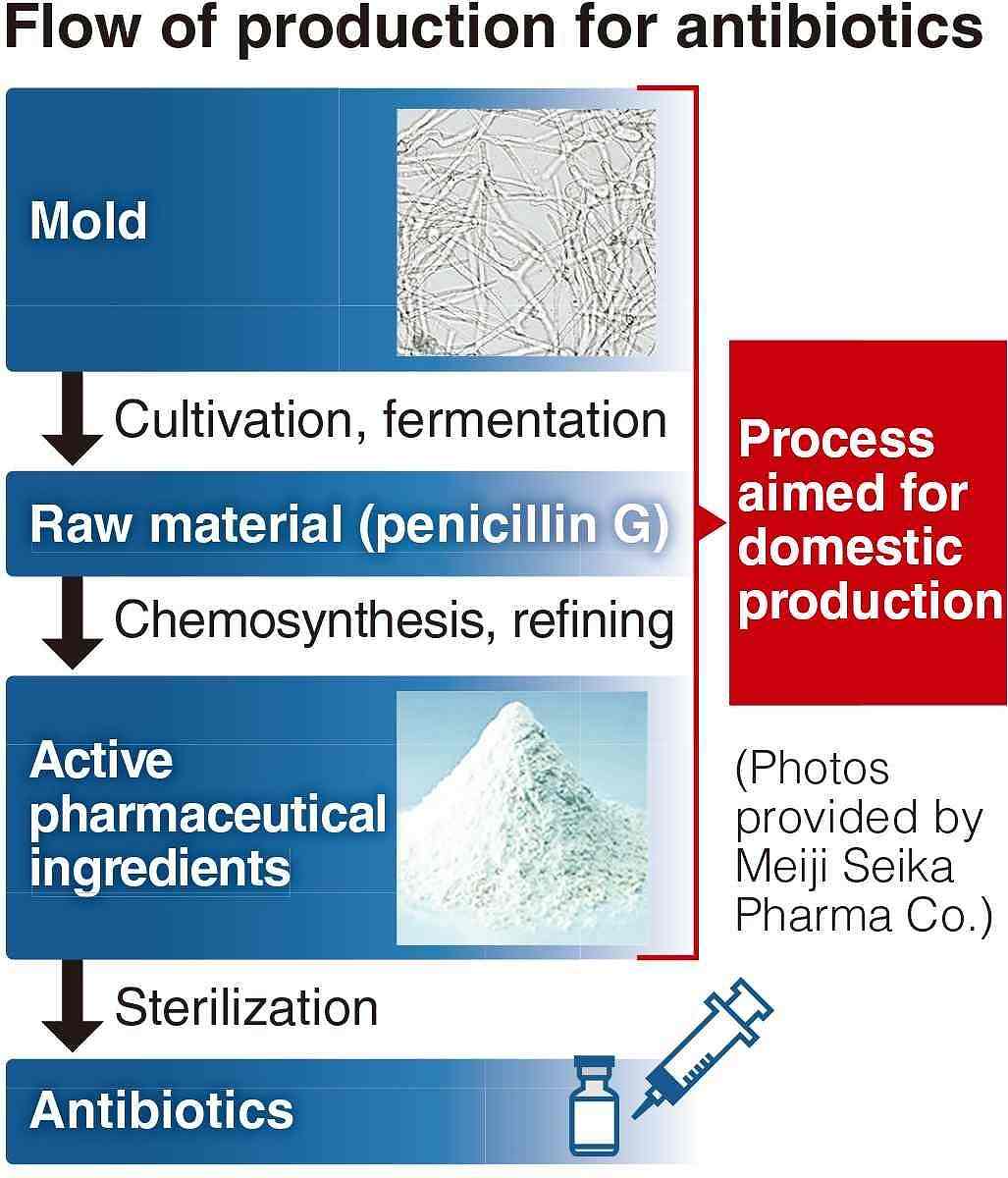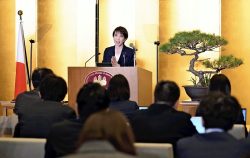Japan Aims to Sever Dependence on China for Antibiotics with Resumed Domestic Production of APIs

The production of active pharmaceutical ingredients for antibiotics is planned to start in one of the largest fermentation tanks in the country at Meiji Seika Pharma Co.’s plant in Gifu Prefecture.
1:00 JST, April 6, 2024
Domestic pharmaceutical companies will resume production of active pharmaceutical ingredients (APIs) for antibiotics for the first time in about 30 years. Construction of a new facility is due to start this spring.
Japan currently relies on imports from China for APIs, which are essential to produce antibiotics. With the international situation becoming increasingly unstable, the government has begun supporting drugmakers to become self-sufficient. Antibiotics, which are also known as antibacterials, kill or inhibit bacterial growth, and are essential for surgery.
However, there are many issues to be addressed in order to sustain domestic production which tends to be expensive.
Reactivating facilities
An 11-meter-high fermentation tank at Meiji Seika Pharma Co.’s Gifu plant in the town of Kitagata, Gifu Prefecture, produced raw materials for the antibiotic penicillin G until 1994. At its peak, the plant produced more than 1,000 tons per year, five times the domestic demand.
The company aims to resume the raw materials’ production in this tank after around 30 years and will begin construction of a new facility to refine the raw materials in May.
The company kept a mold that will be the material for production of the raw materials. “I’m happy to hand over production know-how, such as temperature control, and make use of the knowledge for the country before I retire,” said Koichiro Yamada, 58, who was previously involved in production.
Japan used to actively produce APIs for antibiotics and export them overseas. However, the transfer of technology to China, where labor costs were lower, began in the 1990s. Now, Japan relies on China for most of the APIs for penicillin and other drugs.
In December 2022, the government designated antibiotics as a specified critical product under the Economic Security Promotion Law, along with products such as semiconductors and aircraft parts. The government aids with the production and stockpiling of such products.
The development of coronavirus vaccines highlighted the importance of technology necessary to cope with emergencies. The government plans to establish a system to supply antibiotics for the country by 2030.
Destabilized supply
Supplies of critical products, such as semiconductors and natural gas, are being disrupted around the world against the backdrop of an increasingly tense international situation, including the rift between the United States and China. After a 2010 collision between a Chinese fishing boat and a Japan Coast Guard patrol vessel off the Senkaku Islands, the Chinese government restricted exports of rare earth elements to Japan.
The government is concerned that the supply of antibiotics will also become unstable. “[If that happens,] operations and medical treatment become impossible and may result in the deaths of many patients,” said a senior official of the Health, Labor and Welfare Ministry.
In 2019, supplies of Cefazolin, an antibiotic different from penicillin, were disrupted due to stricter environmental regulations in China that led to suspended factory operations.
At the time, Tokyo Bay Urayasu Ichikawa Medical Center in Chiba Prefecture soon ran out of its Cefazolin stock. Substitute drugs also ran out quickly, and the center was repeatedly forced to change drugs.
“Surgery would have become impossible without antibiotics. We were desperate not to stop performing surgeries,” said Rentaro Oda, then head of the hospital’s infection response office.
The 2019 incident triggered the government to designate antibiotics as a specified critical product.
Securing a stable supply of antibiotics is a common problem worldwide.

Viewing the dependence of pharmaceutical products on China as a problem, the administration of U.S. President Joe Biden compiled a list of 86 critical medicines, including antibiotics, in 2022. The administration has said it plans to both produce APIs domestically and procure them from its allies, including Japan.
In 2021, the European Union designated 34 fields, including APIs, as industrial sectors highly dependent on non-EU countries and difficult to be substituted, and urged member countries to respond to the issue.
Revenue an issue due to drug prices
The Japanese government established a 55-billion-yen fund in 2023 to support the construction of facilities to manufacture APIs for antibiotics. Two groups, both led by Meiji Seika Pharma and Shionogi Pharma Co., a subsidiary of Shionogi & Co., have started making moves.
However, even if production is resumed, it may stop again if profits are not generated. Japanese companies withdrew from the market in the 1990s due to falling drug prices. In 1978, Cefazolin injection was priced ¥2,960 per gram, but its price has fallen to less than 10% at ¥291 in 2023. Domestically produced drugs are said to cost several times higher than Chinese products due to high labor and utility costs.
“It’s essential to build a system that allows domestic production to continue in preparation for emergencies,” said Hideaki Hanaki, head of the Research Center for Infection Control at Kitasato University. “It is necessary for the gvernment to take measures to enable drug manufacturers to earn a certain level of profits, such as raising drug prices for specific products and purchasing raw materials.”
Building a sustainable system is essential to bring the domestic production of antibiotics back on track.

Top Articles in Politics
-

LDP Wins Historic Landslide Victory
-

LDP Wins Landslide Victory, Secures Single-party Majority; Ruling Coalition with JIP Poised to Secure Over 300 seats (UPDATE 1)
-

CRA Leadership Election Will Center on Party Rebuilding; Lower House Defeat Leaves Divisions among Former CDPJ, Komeito Members
-

Japan Tourism Agency Calls for Strengthening Measures Against Overtourism
-

Voters Using AI to Choose Candidates in Japan’s Upcoming General Election; ChatGPT, Other AI Services Found Providing Incorrect Information
JN ACCESS RANKING
-

Japan Institute to Use Domestic Commercial Optical Lattice Clock to Set Japan Standard Time
-

Israeli Ambassador to Japan Speaks about Japan’s Role in the Reconstruction of Gaza
-

Man Infected with Measles May Have Come in Contact with Many People in Tokyo, Went to Store, Restaurant Around When Symptoms Emerged
-

Prudential Life Insurance Plans to Fully Compensate for Damages Caused by Fraudulent Actions Without Waiting for Third-Party Committee Review
-

Woman with Measles Visited Hospital in Tokyo Multiple Times Before Being Diagnosed with Disease






















